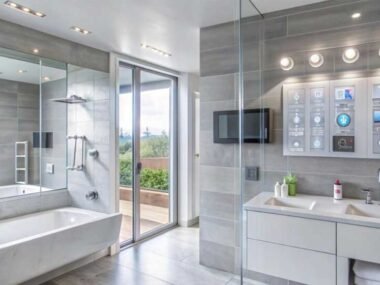Choosing the right air conditioner for your home is a decision that directly impacts comfort, energy efficiency, and long-term costs. With many types and sizes available, it can feel overwhelming to determine which unit best fits your needs. A poorly matched air conditioner can lead to uneven cooling, higher utility bills, and more frequent maintenance issues. On the other hand, the right system ensures consistent comfort, effective temperature regulation, and reliable performance through the seasons. By focusing on size, features, efficiency, and overall compatibility with your living space, you can make an informed choice that strikes a balance between comfort and value.
Determining the right size and capacity
One of the most critical factors in selecting an air conditioner is ensuring the size and capacity align with your home’s requirements. An undersized unit will struggle to cool the home adequately, running constantly without achieving desired temperatures. This not only increases energy costs but also shortens the system’s lifespan. Conversely, an oversized unit cools too quickly without dehumidifying properly, leaving the air clammy and uncomfortable. Proper sizing requires evaluating the square footage of the home, the quality of insulation, ceiling height, and even sun exposure. Professionals often use load calculations to determine the most accurate capacity needed. By choosing an air conditioner that is appropriately matched to your home, you maximize efficiency and ensure comfort throughout every room. A system that fits well saves energy, reduces strain, and provides a consistently comfortable indoor environment that feels balanced year after year.
Exploring different types of air conditioners
Air conditioners come in a variety of types, each designed to meet specific needs. Central air systems provide whole-home comfort by distributing cooled air through ductwork, while ductless mini-split systems offer more flexibility, providing zoned cooling for targeted areas. Window units and portable models are suitable for smaller spaces or temporary needs, but they lack the efficiency and consistency of larger, more permanent systems. Hybrid systems combine electric and gas for greater versatility, while advanced models integrate with smart home technology for added convenience. The choice often depends on your home’s layout, budget, and long-term comfort goals. For larger homes, central air remains the most common solution; however, mini-splits have become increasingly popular among households seeking room-by-room control. Consulting with a trusted company, such as https://legendairtx.com/, offers a wide range of options that can provide clarity on which type will work best for your household’s needs. Each type has advantages and considerations that should align with your priorities.
Considering energy efficiency and long-term savings
Energy efficiency is another key factor in choosing the right air conditioner. Modern units are rated by Seasonal Energy Efficiency Ratio (SEER), with higher ratings indicating better performance. An efficient air conditioner not only lowers monthly utility bills but also reduces the environmental impact of cooling your home. While high-efficiency units may initially cost more, the savings over time often outweigh the upfront expense. Features such as variable-speed compressors, smart thermostats, and energy-saving modes further enhance performance while minimizing waste. For homeowners conscious of sustainability, selecting a unit with high energy efficiency provides peace of mind while delivering consistent comfort.
Additionally, many utility providers and government programs offer rebates for installing efficient systems, which helps offset the costs. When evaluating options, balancing efficiency with your budget ensures that your air conditioner supports both financial and environmental goals. In the long term, this focus provides comfort that is both cost-effective and environmentally responsible.
Additional features that enhance comfort
Modern air conditioners feature a range of enhancements designed to enhance both performance and convenience. Noise reduction technology helps ensure that cooling cycles are quiet, preventing disruption during sleep or relaxation. Advanced filtration systems remove dust, pollen, and allergens, enhancing indoor air quality while maintaining temperature control. Humidity regulation is another feature that improves comfort by preventing sticky air during the hottest months. Many units now offer smart connectivity, allowing homeowners to adjust settings remotely through mobile apps or integrate cooling into broader home automation systems. Zoning capabilities also enable different rooms to maintain distinct temperatures, thereby improving comfort across various spaces. By considering these features, homeowners can personalize their cooling experience, tailoring it to match daily routines and specific household needs. Each feature contributes to comfort in different ways, ensuring that the air conditioner does more than simply lower temperatures—it supports healthier, quieter, and more convenient living environments.
Installation, maintenance, and long-term reliability
The decision to purchase an air conditioner also involves considering installation and future maintenance. Proper installation ensures that the system runs at its intended efficiency, with correct connections, ductwork integration, and calibration. Poor installation can undermine even the most advanced unit, leading to inefficiency and premature breakdowns. Homeowners should also factor in maintenance needs, such as filter replacements, seasonal tune-ups, and periodic inspections, to preserve performance. Reliable maintenance helps extend the unit’s lifespan, reduce repair costs, and sustain energy savings over time. Considering warranties and service agreements can provide additional protection and peace of mind. By planning for both installation and long-term upkeep, homeowners ensure their investment offers consistent performance. A well-installed and well-maintained air conditioner not only cools effectively but also remains dependable for many years, supporting comfort and efficiency across changing seasons and household demands.
Choosing the right air conditioner requires thoughtful consideration of size, type, efficiency, features, and long-term reliability. Each factor contributes to the system’s performance and the level of satisfaction it will deliver over time. A unit that is correctly matched to the home offers comfort without waste, balancing temperature control with humidity management and clean air. By evaluating different types of systems and considering both current and future needs, homeowners make decisions that support lasting comfort and value. Energy efficiency and advanced features provide additional benefits, enhancing the quality of life while reducing costs. Ultimately, an air conditioner is more than a household appliance—it is a long-term investment in comfort, health, and efficiency. With the right choice, families can enjoy a calm, refreshing environment that enhances daily living and supports a sustainable future.










